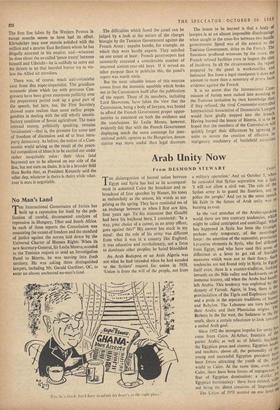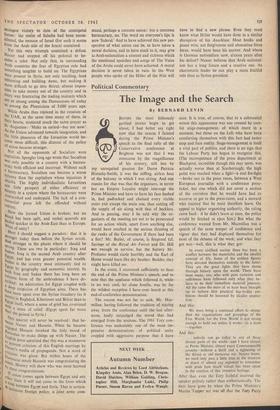Arab Unity Now
From DESMOND STEWART disintegration of formal union between TEgypt and Syria has had as its accompani- ment in autumnal Cairo the broadcast and re- broadcast of four speeches by Nasser, his tones as melancholy as the season, his words as sur- prising as the spring. They have reminded me of an exchange between us when I first saw him, four years ago. To his statement that 'Gandhi had been his boyhood hero, I countered; 'In a way, your choice of a career, as an army officer, goes against this?' His answer has stuck in my mind: that the role of his army was different from what it was in a country like England; it was educative and revolutionary, not a force to dominate other peoples; he hated bloodshed.
An Arab Budapest or an Arab Algeria was not what he had intended when he had acceded to the Syrians' request for union in 1958. `Union is from the will of the people, not from a military operation.' And on October 5, when he conceded that Syrian separation was a fact, 'I will not allow a civil war. The role of the. Syrian army is to guard the frontiers, not 10 police the people: And yet in the same speech his faith in the future of Arab unity was as burning as ever.
In the vast stretches of the Arabic-speaking, world there are two contrary tendencies, which, might be called centripetal and centrifugal. Wha', has happened in Syria has been the triumph, perhaps only temporary, of the centrifugal force: the assertion of the separatist, provincials Levantine elements in Syria, who feel different from Egypt, and who have used this sense of difference as a lever to get rid of Socialist measures which were not to their fancy. Socl; tendencies are not found only in Syria. In EMT' itself even, there is a counter-tradition, looking inwards on the Nile valley and backwards on an immense history, old when the Arabs had hardly left Arabia. This tendency was exploited by the dynasty of Farouk. Again, in Iraq, there is the provincialism of the Tigris and Euphrates walla, and a pride in the separate traditions of Sunier and Babylon. The Lebanese are torn between their Arabic and their Phoenician origins. The Berbers in the far west, the Sudanese in the fa', south, share a certain reluctance to look toosrds a united Arab goal. Since 1952 the strongest impulse for unity 1134 come from Cairo. Al-Azhar, fountain of the purest Arabic as well as of Islamic teaching,' the Egyptian press and cinema; Egyptian boots and teachers; above all, the personality of the, young and successful Egyptian president ha` i; been forces attracting the youth of the Arab world to Cairo. At the same time, even from Cairo, there have been forces of repugnance- fear of Egyptian domination; a dislike P, Egyptian bureaucracy: these have existed, %N. out being the direct creations of Imperialism. The Union of 1958 seemed on one loci the
It A
strongest victory to date of the centripetal forces: the realm of Saladin had been recon- stituted, the menace of Israel (for such it seems from the Arab side of the fence) contained.
Yet this very triumph contained a defeat. Nasser had stepped off his pedestal to be- come a ruler. Not only that, in surrounding Arab countries the fear of Egyptian rule had something tangible to build on. The Egyptians Were present in Syria, not only teaching, land reforming and building dams, but making it More difficult to go into Beirut, almost impos- sible to take money out of the country and in every way frustrating the trading instincts which are as strong among the Damascenes of today as among the Phoenicians of 3,000 years ago.
While Arabs thus rejoiced in the creation of the UAR, at the same time many of them, in their hearts, muttered much the same prayer as St. Augustine:- 'Make us united—but not now.' A the Union advanced towards integration, and the little pleasures of the Levantine world be- came more difficult, this distrust of the policy of union became stronger. Not all the opponents of Socialism were capitalists. Spengler long ago wrote that Socialism Was only possible in a country with a bureau- cracy both efficient and incorrupt. Without such a bureaucracy, Socialism can become a worse tyranny than the capitalism whose injustices it attacks. The highly individualistic Levantines saw little prospect of either efficiency or honesty in a system where the bureaucrats were overworked and underpaid. The lack of a con- troversial press left the offended without redress.
Now the formal Union is broken; but no Mood has been spilt, and verbal quarrels are healed quicker in the Arab. East than in Europe. What of unity? Here I should suggest a paradox : that it is stronger today than before the Syrian revolt. And stronger in the places where it should be. strong. These are two in particular: Iraq and Sudan. Iraq is the second Arab country after Egypt, and has even greater potential wealth. s an is the country most intimately tied to Egypt by geography and economic interest. In both *" Iraq and Sudan there has long been an extreme form of the ambivalence I. have de- "uLed: an admiration for Egypt coupled with bri c -eeP suspicion of Egyptian aims. There has 'ell more upset over the Syrian treachery (as it seems) in Baghdad, Khartoum and Beirut than in wi'tYhOt itself, where a sense of grief has co-existed a sense of relief. (Egypt spent far more than she gained in Syria.) one quarrel will never be resolved : that be- tween Nasser and Hussein. When he became engaged Hussein invoked the holy mood of a tlhadan to make things up with Nasser. The il glish press admitted that this was a manoeuvre to NasPrevent criticism of this English marriage by er ser's media of propaganda. Not a word of i 'cisol was given. But within hours of the cbbell. revolt Hussein was congratulating the ..is. History will show who was most harmed 3, these congratulations. itttl union comes again between Egypt and any ether Stale it will not come in the form which took between Egypt and Syria. That is certain. e °r1lelen foreign policy, a joint army corn- mand, perhaps a customs union: but a common bureaucracy, no. The word on everyone's lips is now 'federal.' And to have achieved this new per- spective of what union can be, to have taken a moral decision, and to have stuck to it, may give to Arab nationalism a content and richness which the emotional speeches and songs of The Voice of the Arabs could never have achieved. A moral decision is never taken in vain. In the West people who spoke of the Hitler of the Nile will have to find a new phrase. Even they must know what Hitler would have done in a similar disruption of his Anschluss. Meat hooks and piano wire, not forgiveness and abstention from force, would have been his answer. And where is German nationalism now, sixteen years after his defeat? Nasser believes that Arab national- ism has a long future and a creative one. As charismatic leader he can play a more fruitful role than as Syrian president.







































 Previous page
Previous page